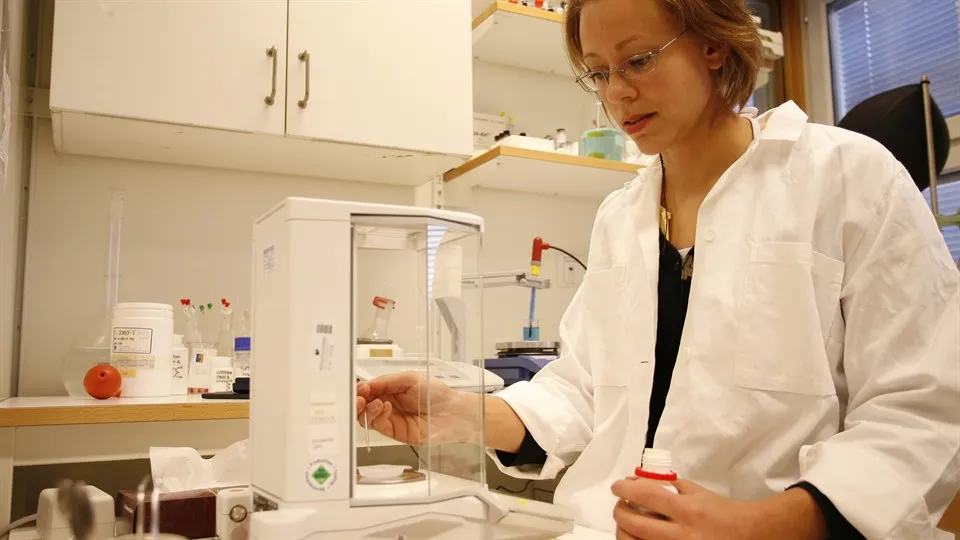Projects in Chemistry
Current projects in chemistry available for application.
MbR - Projects in Chemistry
Focus: Analytical Chemistry
Analytical chemistry focuses on the methods and techniques used to separate, identify, and accurately quantify the components of a sample. It involves both qualitative analysis (determining the identity of substances) and quantitative analysis (measuring the amount of each substance). Analytical chemistry is essential in various fields, including environmental science (pollutants detection, water quality analysis), pharmaceuticals and human health (drug formulation, quality control, metabolites, biomarkers), food safety (contaminant detection, nutritional analysis), etc., as it provides critical data for understanding and controlling the composition of materials. Key techniques include chromatography, spectroscopy, and mass spectrometry.
Available research projects/positions in the focus area: Not available positions at the moment
Research group and contact information:
Here you'll find further information on the Analytical Chemistry research group:
Focus: Organic Chemistry
Organic chemistry is the branch of chemistry that focuses on the study of carbon-containing compounds, particularly their structure, properties, reactions, and synthesis. It has a relevant role in understanding and designing molecules that have practical applications in various fields. In the context of the given projects, organic chemistry involves the analysis and synthesis of semiochemicals, which are chemical signals used by organisms for communication. These semiochemicals are crucial for environmentally friendly solutions, such as protecting plants, trees, and wood from insects and fungi, as well as for monitoring threatened species through conservation methods. The ability to design and synthesize these compounds is an essential aspect of organic chemistry, with significant applications in environmental protection and conservation
Available research projects/positions in the focus area:
Analysis and synthesis of semiochemicals and investigation of their use in environmentally friendly protection of plants, trees and wood from insects and fungi (1 position).
Analysis and synthesis of semiochemicals and investigation of their use in methods for conservation monitoring of threatened species (1 position).
Research group and contact information:
Here you'll find further information on the EcoChemistry research group
If you are interested in these open positions, please contact:
Dr. Erika Wallin
erika.wallin@miun.se
or telephone +46 10 142 84 91
Focus: Biochemistry and the Circular Bioeconomy
Biochemistry, the study of chemical products and processes within living organisms, plays a vital role in advancing the circular bioeconomy by leveraging biomolecules such as proteins, enzymes, lipids and carbohydrates to drive sustainable innovations. A circular bioeconomy emphasizes the use of renewable resources, minimizing waste, and replacing the wide range of non-sustainable products currently in use. By integrating biotechnology into new methods and technological innovations, production sectors like industry, agriculture and forestry can work in a more circular manner. Our research contributes to this when using renewable resources as industrial waste side-streams of lignocellulose material in fermentation with fungi, yeasts, algae and bacteria to produce, new food and feed, bioenergy and biomaterials, fostering long-term environmental sustainability.
Available research projects/positions in the focus area:
Screening and optimising in fermentation the yield of fatty acids and protein using from nature isolated yeast species and industrial waste side-streams of lignocellulose material (1 position)
Screening and optimising in fermentation the yield of fatty acids and protein using from nature isolated fungi species and industrial waste side-streams of lignocellulose material (1 position)
Screening and optimising in fermentation the yield of biofuels using microbes and industrial waste side-streams of lignocellulose material (1 position)
Using waste materials from the brewing industry to develop processes and marketable products (1 position)
Screening the possibility of using microbes to remove and break down PFAS in different waste materials (1 position)
Research group and contact information:
Here you'll find further information on the EcoChemistry research group
If you are interested in these open positions, please contact:
Prof. Erik Hedenström
erik.hedenstrom@miun.se
or telephone +46 010-142 87 29.
Focus: Environmental Chemistry
Environmental chemistry is the study of chemical processes occurring in the environment, including the sources, reactions, transport, and effects of chemical substances in biota, air, water, soil, and sediments. It involves the analysis of harmful substances in natural and anthropogenic systems and the development of methods to assess the fate and behaviour of these pollutants in contaminated environments, ultimately contributing to better environmental management and remediation strategies. Analytical chemistry methods and techniques are the cornerstone of environmental chemistry studies.
Available research projects/positions in the focus area:
Development and optimization of assessment methods to evaluate the bioavailability of persistent organic pollutants (POPs) in soils and sediments with aged contamination (1 position).
Fractionation of toxic metals to assess their fate before and after biological treatment of contaminated soils, sediments, or organic wastes (1 position).
Development and validation of laboratory chemical leaching tests to evaluate the fate of organic pollutants and/or toxic metals following biochar application in contaminated environmental matrices (1 position).
Research group and contact information:
Here you'll find further information on the EcoChemistry research group
If you are interested in these open positions, please contact:
Dr. Gabriela Paladino
gabriela.paladino@miun.se
or telephone +46 010-142 80 91
The projects will be performed in close collaboration between all MbR students, with current and coming PhD students, post docs, researchers and professors in the research groups and collaborators within Mid Sweden University and at various universities in Sweden, Europe, America and Asia.
